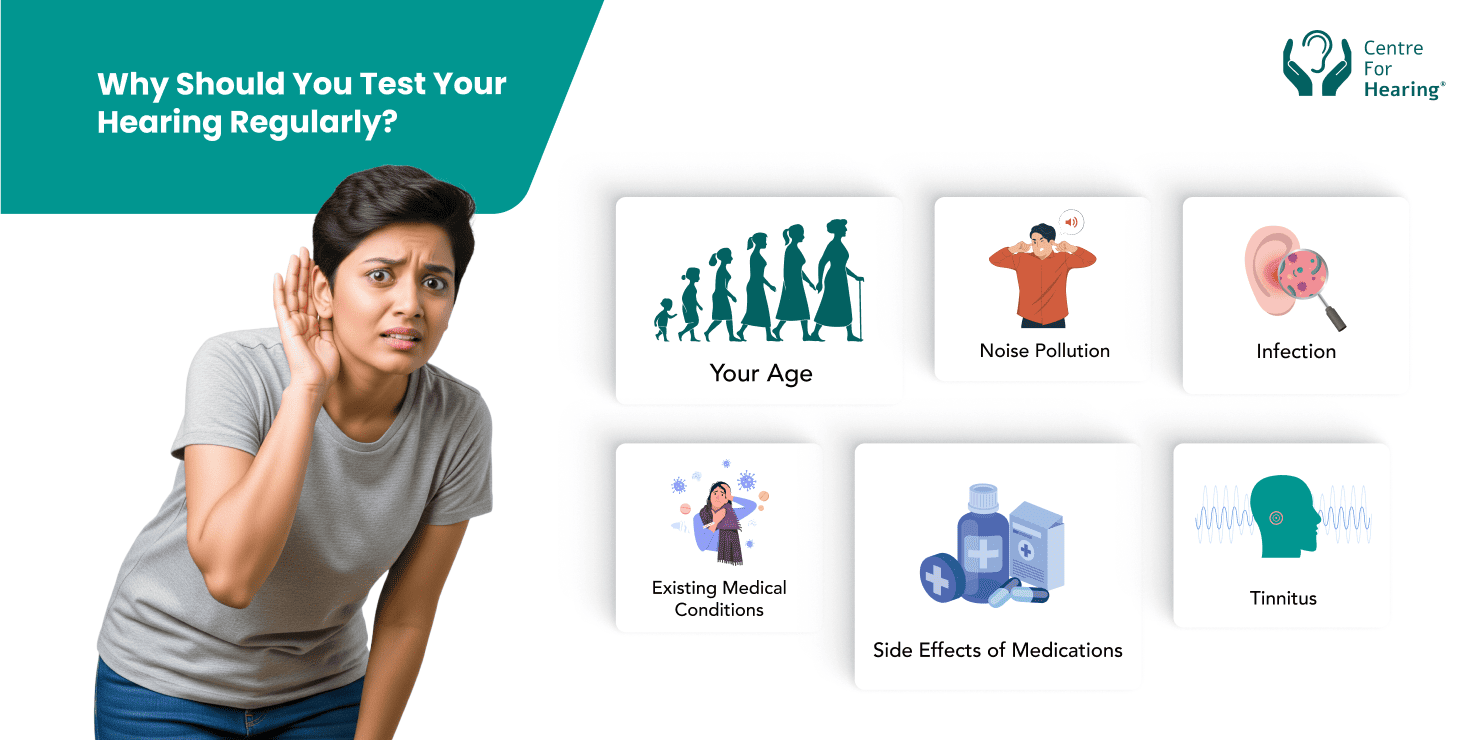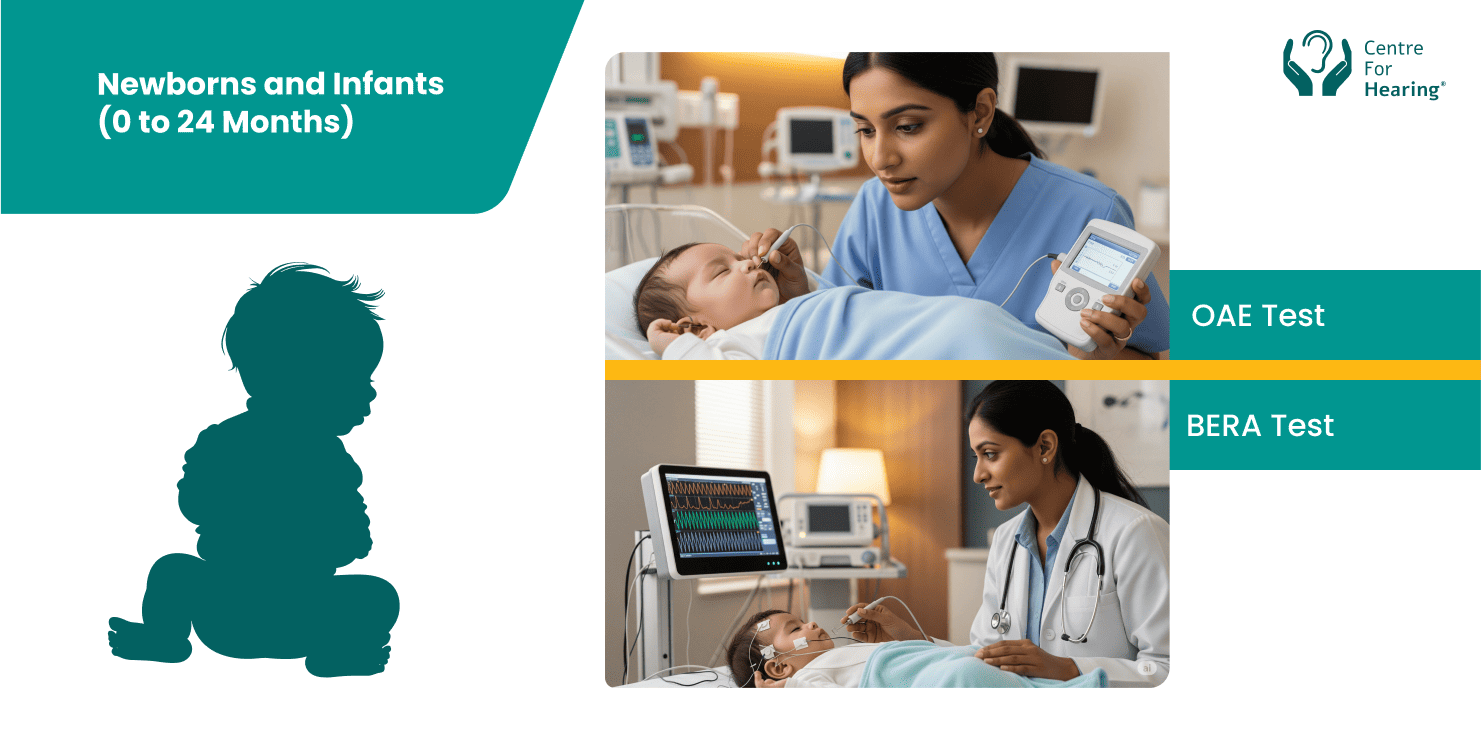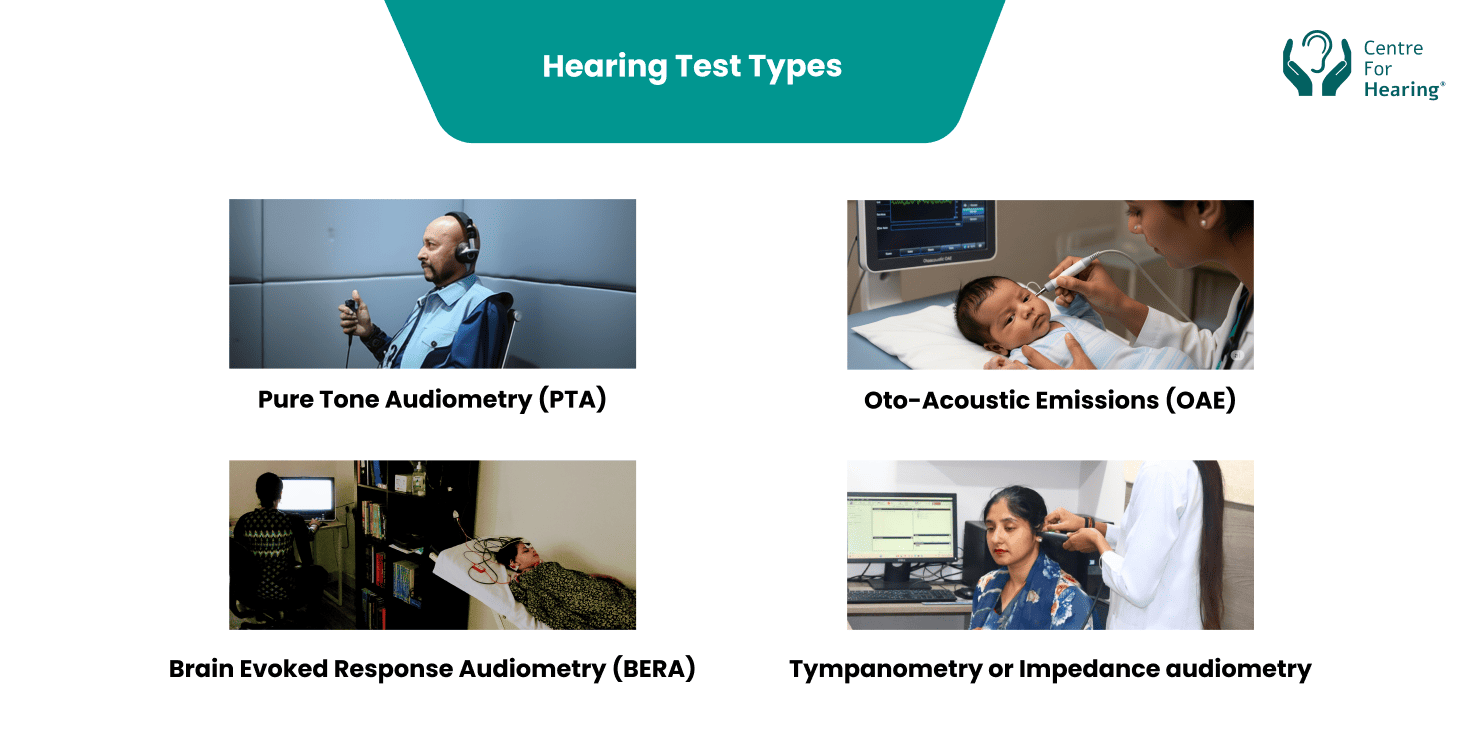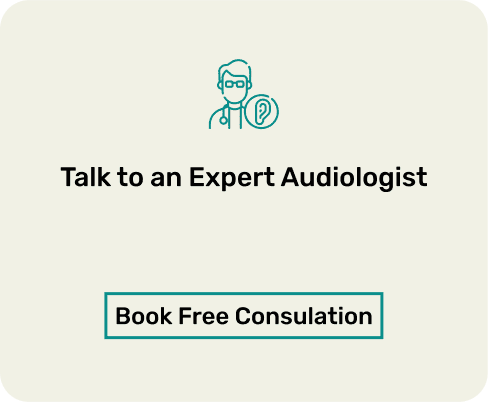Hearing test isn’t just for people who already have hearing difficulties. In fact, they are as important as dental and vision health check-ups and must be done as frequently. Many of us skip testing our ears until we notice problems. But doing so can cost us years of better hearing and make treatment and rehabilitation more challenging.
Hearing changes (deteriorates) gradually with the years, much like eyesight. However, for some, the progress is more aggressive. Regular hearing assessments can catch the early signs of hearing loss, tinnitus, or other ear-related conditions, when treatment options work best.
Expert audiologists at Centre for Hearing® recommend taking the test on time based on your age, risk factors, and lifestyle. If you are interested in scheduling a hearing test, read on, as this blog provides clear recommendations on the age-based timeline, test options, and cost of hearing aids.
Why Should You Test Your Hearing Regularly?

A hearing test is like an early health signal that helps you catch problems before they turn into permanent hearing loss. Unlike a broken bone that heals, damaged hearing cells don’t regenerate. Once gone, it is forever.
Several factors that contribute to hearing loss throughout your life are:
- Your Age: Hair cells in your inner ear naturally deteriorate over time.
- Noise Pollution: Exposure to loud noises every day, like traffic, machinery, music, television, and never-ending phone calls.
- Infection: Recurring ear infections can scar your eardrum and middle ear bones.
- Side Effects of Medications: Certain antibiotics, pain relievers, and chemotherapy drugs can damage hearing either temporarily or permanently.
- Existing Medical Conditions: Diabetes, high blood pressure, and cardiovascular diseases may affect blood flow to your ears.
- Tinnitus: It is the persistent ringing or buzzing in your ears that may often signal an underlying hearing issue that could lead to permanent loss if not treated on time.
- Other Causes: Genetic factors and excessive earwax buildup increase your risk of early hearing problems.
If you’re looking for a hearing test in Delhi, contact us at +91 9811 227 269 for a comprehensive assessment.
How Often Should You Get a Hearing Test: Complete Age-Wise Breakdown

Based on your existing hearing health condition, age, risk factors, and lifestyle, your audiologist will schedule the test frequency. Usually, healthy adults who don’t have any symptoms should test their hearing every 3-5 years until the age of 60 years, then annually thereafter.
However, specific cases, such as people who are exposed to noise pollution, have a family history of hearing loss, or are under certain prescribed medications, might require more frequent testing. Given below is the age-wise test recommendation:
Schedule an Online Hearing Test Now!
Newborns and Infants (0 to 24 Months)

Test Conducted: At birth, 6 months, and annually
Newborns are tested for hearing within 48 hours of birth. The OAE test (Oto-Acoustic Emissions) checks if your baby’s inner ear responds properly to sounds.
Don’t panic if your baby doesn’t pass the first screening. Sometimes fluid in the ears or the wax coating (vernix) can make a hearing test fail. Follow-up testing, which happens in 2-4 weeks, provides clearer results.
Babies who fail the second screening, the advanced BERA hearing test (Brain Evoked Response Audiometry), show detailed information.
Early identification at this age is crucial, as hearing aids and cochlear implants before age 6 months deliver the best results and help babies develop language skills as fast as other babies.
Book the BERA Test in Delhi for your Newborn Baby Now!
Toddlers and School-Going Children (2 – 18 Years)
Test Conducted: Every 1-3 years or when there are any symptoms
School-going children are more prone to seasonal ear infections, which may cause temporary hearing loss. You shouldn’t worry about your kid at this point.
Just watch out for signs like turning up the TV volume quite high, speech delays, unclear pronunciation, and complaints about ear pain.
On the other hand, teenagers today face new risks from personal music devices, concerts, gaming headphones, and recreational noise exposure. In fact, the WHO warns that 1 billion young people are at risk of hearing loss due to unsafe listening practices. Middle ear problems are common in this age group and can be detected with tests like tympanometry.
Young Adults and Working Professionals Age 18 to 40 Years
Test Conducted: Every 3- 5 years, depending upon symptoms and risk factors
Young adults have excellent hearing health but are more exposed to noise pollution from careers, hobbies, and fun activities.
Musicians, construction workers, factory personnel, and people in the defence must test their hearing annually.
Even working professionals using headphones for 8 – 9 hours every day must check their hearing regularly.
Follow the proven 80-90 rule. This rule states that you are in the risk zone if you hear sounds louder than 80 decibels for eight hours or 90 decibels for more than 15 minutes.
Middle Aged Adults (40 to 65 Years)
Test Conducted: 1 – 3 years
This is usually the phase when age-related hearing health decline starts to show up. You might find it difficult to understand conversations in crowded places, miss phone rings, or ask people to repeat themselves more often. These are small warning signs that you shouldn’t ignore.
Early hearing screening can simplify treatment plans and improve prognosis. So, schedule your hearing test in Delhi now!
Senior Citizens (65+ Years)
Test Conducted: Every year
Two-thirds of adults over 65 years have some degree of hearing loss. Age-related hearing changes affect both ears and progress slowly. Regular testing can help improve the quality of life.
However, sudden hearing loss could mean something serious and must be tested immediately. Untreated hearing loss can increase the risk of depression, cognitive decline, vertigo, and falls.
Expert audiologists use real ear measurements when deciding the right hearing aid for seniors. These tests ensure the hearing aids provide optimal amplification for each individual’s ear canal acoustics.
Hearing Test Types and Cost of Hearing Aids in India

Hearing tests vary based on purpose and patient needs.
- Pure Tone Audiometry (PTA) measures the softest sounds you can hear at different pitches.
- Brain Evoked Response Audiometry (BERA) tracks how sound signals travel to your brain. It is ideal for infants or those unable to respond actively.
- Oto-Acoustic Emissions (OAE) check inner ear hair cell health and are often used for newborn screenings.
- Tympanometry or Impedance audiometry assesses middle ear function and detects fluid, eardrum issues, or bone problems.
Hearing aids in India cost between ₹20,000 and ₹300,000+ per ear. Here’s a breakdown:
- Entry-level models costing between ₹20,000 and ₹40,000 suit mild loss.
- Essential class ranges from ₹40,000 to ₹75,000 and offers better noise control.
- Standard hearing aids cost from ₹75,000 to ₹1.5L and come with Bluetooth connectivity and recharge options.
- Premium, hi-tech hearing aids, which start from ₹1.5L to ₹2L and go up to ₹3L, offer advanced features, like machine learning, AI-powered sound, and tinnitus relief.
FAQs
How Long Does a Hearing Test Take?
Basic audiometry usually takes 20 to 30 minutes. However, a comprehensive hearing screening, which includes pure tone audiometry, speech audiometry, and additional tests, may take up to 60 minutes.
Is the BERA Test Painful for Children?
The BERA test is not painful. Centre for Hearing® uses a noninvasive, needleless procedure that’s safe for children’s sensitive ears and skin.
What Kind of Preparation Do I Need to Do Before the Test?
Hearing tests generally do not require any preparation. But here are a few things that might smooth the process:
- If you have excessive earwax, get it cleaned before the test.
- Avoid exposure to loud noises 24 hours before the test if possible.
- Please mention the list of medications you are currently taking to your doctor.
- Carry your health insurance policy or card.
Where Can I Get a Hearing Test Near Me?
You can get your hearing test done at the Centre for Hearing®. We offer hearing test services in Delhi NCR, Chandigarh, Punjab, and nearby cities. Call +91 9811227269 to schedule an appointment.
What is the Cost of Hearing Tests?
A basic hearing test (PTA) generally costs between Rs. 800 to Rs. 1200 in Delhi, Gurgaon, Chandigarh, Patiala, Jalandhar, Ludhiana, Dwarka, Mohali and Panchkula.
Final Takeaway
Hearing health should never be left to chance. Through regular audiometry tests, most hearing issues can be managed with timely interventions like hearing aids, medical treatments, and preventive care.
Centre for Hearing® brings 50+ years of expertise in comprehensive hearing care across India. Our RCI-certified audiologists use state-of-the-art equipment for accurate hearing testing and diagnosis, personalised treatment recommendations, and hearing aids from globally renowned brands like ReSound, Phonak, Widex, Signia, Starkey, and Oticon.
We have helped over 3,00,000+ clients across Delhi, Gurgaon, Chandigarh Tricity, and Punjab. We also offer free telephonic consultations and home visit facilities.
For more information about hearing loss, suitable hearing tests, and costs, contact us at +91 9811 227 269 for a comprehensive assessment.



















